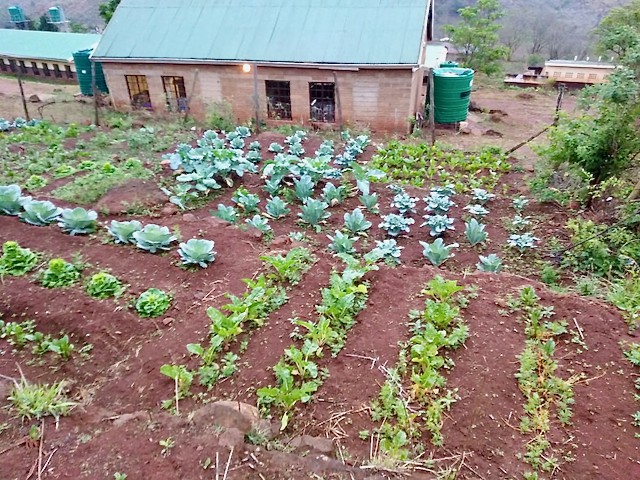How a rural KZN school keeps hunger away
“You find that the food they get at school is their only meal for the day”
Emakhabeni Primary School established its vegetable garden two years ago. Photo supplied
Nothing is more disturbing than having a learner in class who can’t concentrate because he or she is hungry, says Nkanyiso Zondi, principal of Emakhabeleni Primary School, in Kranskop in the uMzinyathi District, northern KwaZulu-Natal
The school has 129 learners from Grade R to Grade 7. They get a different meal every day from Monday to Friday. They are fed at 10am, because they arrive tired and hungry, says Zondi. “These learners endure a lot of hardships, including long distances they have to travel to school.”
“With our school being in a rural area, most of our learners live with their grandparents while their parents are in the city working or looking for jobs … You find that the food they get at school is their only meal for the day,” he says.
“Most parents cannot afford school uniforms, which becomes a problem especially in winter because learners don’t have jerseys but we ask them to wear what they have to keep warm,” says Zondi.
“Sometimes they come to school without having breakfast. I know how difficult it is to concentrate in class when you are hungry. That is why we make sure that they all eat and that the food supplied to us is healthy and balanced,” says Zandile Ngcobo, who oversees food preparations.
On Monday, it is amasi, a mixture of phuthu and sour milk with a fruit as a side; on Tuesdays, samp and beans with carrots as a side; on Wednesday, rice and soya with either spinach or boiled cabbage as a side; on Thursday, phuthu and beans with butternut as a side; and on Friday, rice and canned fish with tomatoes or cabbage.
“The food we get is enough for all the learners and I make sure that they all eat … We don’t have enough plates for all the 129 learners,” says Ngcobo.
“The lady who prepares the food ensures that all Covid-19 regulations are adhered to. We ensure that all our vegetables are washed and that we have enough food before she starts cooking,” she says.
She says because of the Covid-19 pandemic, the school has one class that rotates. “However, learners still come to collect their food and it is their right to do so,” says Ngcobo.
Ingredients are supplied by the National School Nutrition Programme (NSNP) and supplemented with spinach and cabbage from the school garden, established two years ago.
According to the Department of Education 175,034 learners at 359 primary schools, two special needs schools and 122 high schools benefit from the NSNP programme in Umzinyathi district learners.
Support independent journalism
Donate using Payfast

Don't miss out on the latest news
We respect your privacy, and promise we won't spam you.
Next: Can you smoke dagga before work?
Previous: Rondebosch Golf Club lease renewal under fire from housing activists
© 2020 GroundUp. This article is licensed under a Creative Commons Attribution-NoDerivatives 4.0 International License.
You may republish this article, so long as you credit the authors and GroundUp, and do not change the text. Please include a link back to the original article.

